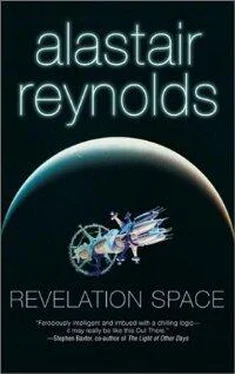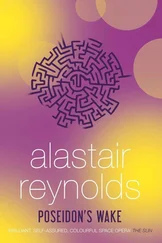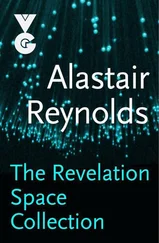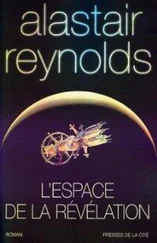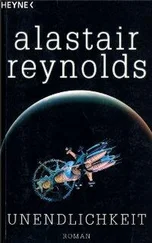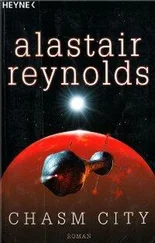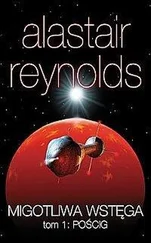In the end, it was a lot more than a clue.
It was difficult to remember how long he had waited, on that day when the waiting finally paid off. For all that he intended to focus his mind with absolute attentiveness on what Lascaille was doing, he had been finding it increasingly difficult. It was like staring intently at a long series of abstract paintings—one’s concentration inevitably began to wane, no matter how much one tried to keep it fresh. Lascaille had been halfway through the sixth or seventh hopeless chalk mandala of the day, executing the task with the same fervent dedication he brought to every mark he made.
Then, with no forewarning, he had turned to Sylveste and said, with complete clarity: “The Jugglers offer the key, Doctor.”
Sylveste was too shocked to interrupt.
“It was explained to me,” Lascaille continued blithely. “While I was in Revelation Space.”
Sylveste forced himself to nod, as naturally as possible. Some still-calm part of his mind recognised the phrase which Lascaille had spoken. As far as anyone had ever been able to tell, it was what Lascaille now called the Shroud boundary—‘space’ in which he had been granted certain “revelations’ too abstruse to relate.
Yet now his tongue seemed to have been loosened.
“There was a time when the Shrouders travelled between the stars,” Lascaille said. “Much as we do now—although they were an ancient species and had been starfaring for many millions of years. They were quite alien, you know.” He paused to switch a blue chalk for a crimson one, placing it between his toes. With that, he continued his work on the mandala. But with his hand—now free from that task—he began to sketch something on an adjacent patch of ground. The creature he drew was multi-limbed, tentacled, armour-plated, spined, barely symmetrical. It looked less like a member of a starfaring alien culture than something which might have flopped and oozed its way across the bed of a Precambrian ocean. It was utterly monstrous.
“That’s a Shrouder?” Sylveste said, with a shiver of anticipation. “You actually met one?”
“No; I never truly entered the Shroud,” Lascaille said. “But they communicated with me. They revealed themselves to my mind; imparted much of their history and nature.”
Sylveste tore his gaze away from the nightmarish creature. “Where do the Jugglers come into it?”
“The Pattern Jugglers have been around for a long time and they’re to be found on many worlds. All starfaring cultures in this part of the galaxy encounter them sooner or later.” Lascaille tapped his sketch. “Just like we did, so did the Shrouders, only very much earlier. Do you understand what I’m saying, Doctor?”
“Yes…” He thought he did, anyway. “But not the point of it.”
Lascaille smiled. “Whoever—or whatever—visits the Jugglers is remembered by them. Remembered absolutely, that is—down to the last cell; the last synaptic connection. That’s what the Jugglers are. A vast biological archiving system.”
This was true enough, Sylveste knew. Humans had gleaned very little of significance concerning the Jugglers, their function or origin. But what had become clear almost from the outset was that the Jugglers were capable of storing human personalities within their oceanic matrix, so that anyone who swam in the Juggler sea—and was dissolved and reconstituted in the process—would have achieved a kind of immortality. Later, those patterns could be realised again; temporarily imprinted in the mind of another human. The process was muddy and biological, so the stored patterns were contaminated by millions of other impressions, each subtly influencing the other. Even in the early days of Juggler exploration it had been obvious that the ocean had stored patterns of alien thought; hints of otherness bleeding into the thoughts of the swimmers—but these impressions had always remained indistinct.
“So the Shrouders were remembered by the Jugglers,” Sylveste said. “But how does that help us?”
“More than you realise. The Shrouders may look alien, but the basic architectures of their minds were not completely dissimilar to our own. Ignore the bodyplan; realise instead that they were social creatures with a verbal language and the same perceptual environment. To some degree, a human could be made to think like a Shrouder, without becoming completely inhuman in the process.” He looked at Sylveste again. “It would be within the capabilities of the Jugglers to instil a Shrouder neural transform within a human neocortex.”
It was a chilling thought: achieve contact not by meeting an alien, but by becoming it. If that was what Lascaille meant. “How would that help us?”
“It would stop the Shroud from killing you.”
“I don’t follow you.”
“Understand that the Shroud is a protective structure. What lies within are… not just the Shrouders themselves, but technologies which are simply too powerful to be allowed to fall into the wrong hands. Over millions of years, the Shrouders combed the galaxy seeking harmful things left over by extinct cultures—things which I can almost not even begin to describe to you. Things which may once have served good, but which are also capable of being used as weapons of unimaginable horror. Technologies and techniques which may only be deployed by ascended races: means of manipulating spacetime, or of moving faster-than-light… other things which your mind literally can’t encompass.”
Sylveste wondered if that really were the case. “Then the Shrouds are—what? Treasure chests, where only the most advanced races get the keys?”
“More than that. They defend themselves against intruders. A Shroud’s boundary is almost a living thing. It responds to the thought patterns of those who enter it. If the patterns do not resemble those of the Shrouders… it fights back. It alters spacetime locally, creating vicious eddies of curvature. Curvature equals gravitational sheer stress, Doctor. It rips you apart. But the right kinds of mind… the Shroud admits them; guides them closer, protects them in a pocket of quiet space.”
The implications, Sylveste saw, were shattering. Think like a Shrouder and one could slip past those defences… into the glittering heart of the treasure box. So what if humans were not advanced enough by Shrouder reckoning to behold that treasure? If they were clever enough to break open the box, were they not entitled to take what they found? According to Lascaille, the Shrouders had assumed the role of galactic matron when they secreted those harmful technologies… but had anyone asked them to do it? Then another question ghosted into his mind.
“Why did they let you know this, if what was inside the Shrouds had to be protected at all costs?”
“I don’t know if it was intentional. The barrier around the Shroud that bears my name must have failed to identify me as alien, if only fleetingly. Perhaps it was damaged, or perhaps my… state of mind… confused it. Once I had begun to penetrate the Shroud, information began to flow between us. That was how I learned these things. What the Shroud contained, and how its defences might be circumvented. It’s not a trick machines can learn, you know.” The last remark seemed to have come from nowhere; for a moment it hung there before Lascaille continued. “But the Shroud must have begun to suspect that I was foreign. It rejected me; flung me back out into space.”
“Why didn’t it just kill you?”
“It must not have been completely confident in its judgement.” He paused. “In Revelation Space, I did sense doubt. Vast arguments taking place around me, quicker than thought. In the end, caution must have won the day.”
Now another question; the one he had wanted to ask since the moment Lascaille had opened his mouth.
Читать дальше
